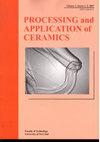原位成形矿化剂辅助下低温合成NaSICON NaZr2(PO4)3粉体
IF 0.8
4区 材料科学
Q3 MATERIALS SCIENCE, CERAMICS
引用次数: 0
摘要
研究了在330℃低温下制备NaZr2(PO4)3 (NZP)粉体的新方法。不同摩尔比ZrO(NO3)2 ?xH2O变成NaH2PO4 ?采用XRD、FE-SEM、TEM、EDS和拉曼光谱等方法系统研究了2H2O对NZP粉体合成的影响。矿化剂NaNO3是由原料ZrO(NO3)2 ?xH2O和NaH2PO4 ?在研磨过程中加入2H2O。采用Zr:P = 2:6的最佳摩尔比,可制得结晶度高、分散性好、粒径在500 ~ 700 nm范围内的NZP粉体。以2 wt.%的ZnO为助烧剂,在1100℃下烧结3 h,制得致密的NZP陶瓷。烧结陶瓷的相对密度和维氏硬度分别达到93.4%和704MPa。本文章由计算机程序翻译,如有差异,请以英文原文为准。
Low temperature synthesis of NaSICON NaZr2(PO4)3 powders with the assistance of in situ formed mineralizer
A new approach was developed to prepare NaZr2(PO4)3 (NZP) powders at low temperature of 330?C. The effect of different molar ratios of ZrO(NO3)2 ? xH2O to NaH2PO4 ? 2H2O on the synthesis of NZP powders was systematically investigated by XRD, FE-SEM, TEM, EDS and Raman spectroscopy. The mineralizer NaNO3 was formed in situ due to the mechanochemical reaction between raw materials ZrO(NO3)2 ? xH2O and NaH2PO4 ? 2H2O during the grinding process. When the optimal molar ratio of Zr:P = 2:6 was used, the NZP powders with high crystallinity, good dispersity and particle sizes in the range of 500-700 nm were obtained. The dense NZP ceramics was obtained by sintering at 1100 ?C for 3 h with 2 wt.% ZnO as the sintering aid. The relative density and Vickers hardness of the sintered ceramics reached 93.4% and 704MPa, respectively.
求助全文
通过发布文献求助,成功后即可免费获取论文全文。
去求助
来源期刊

Processing and Application of Ceramics
MATERIALS SCIENCE, CERAMICS-
CiteScore
1.90
自引率
9.10%
发文量
14
审稿时长
10 weeks
期刊介绍:
Information not localized
 求助内容:
求助内容: 应助结果提醒方式:
应助结果提醒方式:


